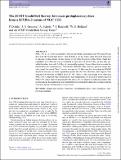The JCMT Gould Belt Survey : low-mass protoplanetary discs from a SCUBA-2 census of NGC 1333
Abstract
NGC 1333 is a 1–2 Myr old cluster of stars in the Perseus molecular cloud. We used 850 μm data from the Gould Belt Survey with SCUBA-2 on the James Clerk Maxwell Telescope to measure or place limits on disc masses for 82 Class II sources in this cluster. Eight disc candidates were detected; one is estimated to have mass of about 9 MJup in dust plus gas, while the others host only 2–4 MJup of circumstellar material. None of these discs exceeds the threshold for the ‘minimum mass solar nebula’ (MMSN). This reinforces previous claims that only a small fraction of Class II sources at an age of 1–2 Myr have discs exceeding the MMSN threshold and thus can form a planetary system like our own. However, other regions with similarly low fractions of MMSN discs (IC 348, UpSco, σ Ori) are thought to be older than NGC 1333. Compared with coeval regions, the exceptionally low fraction of massive discs in NGC 1333 cannot easily be explained by the effects of UV radiation or stellar encounters. Our results indicate that additional environmental factors significantly affect disc evolution and the outcome of planet formation by core accretion.
Citation
Dodds , P , Greaves , J S , Scholz , A , Hatchell , J , Holland , W S & JCMT Gould Belt Survey Team 2015 , ' The JCMT Gould Belt Survey : low-mass protoplanetary discs from a SCUBA-2 census of NGC 1333 ' , Monthly Notices of the Royal Astronomical Society , vol. 447 , no. 1 , pp. 722-727 . https://doi.org/10.1093/mnras/stu2415
Publication
Monthly Notices of the Royal Astronomical Society
Status
Peer reviewed
ISSN
0035-8711Type
Journal article
Description
Date of Acceptance: 12/11/2014Collections
Items in the St Andrews Research Repository are protected by copyright, with all rights reserved, unless otherwise indicated.

